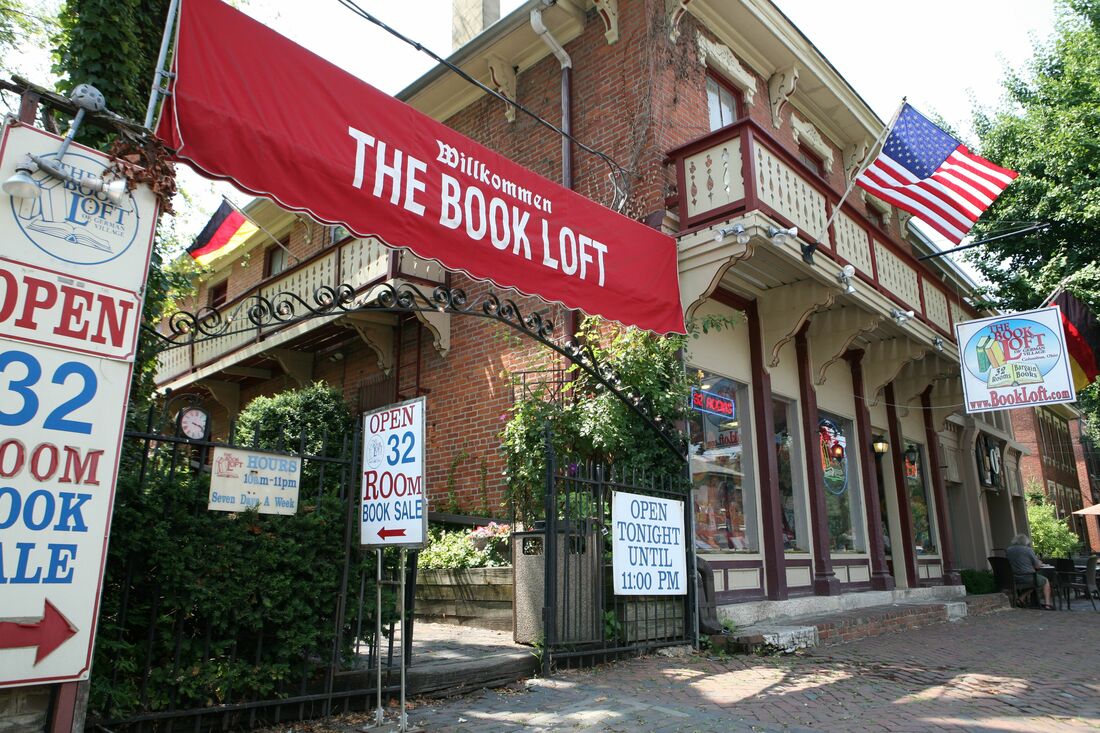|
During last Sunday's service at Peace Lutheran we had a little welcoming ceremony for some new members.
There were about half a dozen new people and our pastor Doug Warburton had them come to the front of the room where he invited each one to tell a little about themselves and what brought them to our congregation. There was one married couple, both retired professionals, who told us about how they'd moved to Columbus two years ago from a small town in Eastern Ohio to be close to their daughter and grandchildren. They spoke a bit about the joy of being near their grandchildren and how welcome they felt at Peace. When the man added that what most impressed him about Columbus was how everyone opened the door I thought he was speaking figuratively about how friendly Columbus people were. But no, he literally meant that he was impressed by how people in this city open and hold the door for each other when they're entering or exiting a public building. He said that in the small town where he was from people as a rule let the door close in each other's faces. I was intrigued by the man's observation and after the service I approached the couple and asked them, do people in your town really not hold the door for each other? What about all that homey friendliness we always associate with small town ways? But now you're telling me that where you're from people don't hold the door? "No, they don't," the man replied. He and his wife then proceeded to debunk for me the myth of small-town hospitality, though that somehow seemed beside the point of whether or not people hold the door. I mean, isn't holding the door an instinctive thing that people just automatically do for each other? The acts of holding the door or having it held for me seem such unconscious transactions that I've never even noticed whether Columbus people practice them more or less often than people elsewhere. But these newcomers to Columbus did notice. "Even the children here hold the door," said the man from my church, recalling how on occasion parents have told their children to run ahead and hold the door for him. From their experience the couple found door-holding to be a not-so-common courtesy. At least not in their town. What a peculiar town they must be from, thought I. Later that evening when my son Tommy and my nephew Randy came over for Sunday dinner I recounted the story of the couple from a town where people didn't hold the door, thinking they would find the couple’s response to local door-holding custom as curious as I did. But no again. Tommy said that one time a co-worker from Boston commented to him on how unusual it felt when he arrived in Columbus to have all this door-holding going on, and on another occasion Tommy heard a similar comment about Columbus door-holding offered by an acquaintance transplanted from Miami. “Really?” I asked, now wondering if we people of Columbus might be a band of door-holding outliers. Randy then jumped into the conversation and began talking about how, far from coming naturally, door-holding as it is practiced in these parts can actually require some tactical maneuvering. He brought up a couple of common awkward scenarios, such as when two people arrive at the door at the same time, who holds the door for whom? Or most vexing, according to Randy, is when you're approaching the door from a distance and can see that there's another person directly across from you and you're both converging on the door at approximately the same rate of speed and so you must now decide how you're going to pace yourself. Are you going to slow down and to allow the other person to get the door first, making sure to lag far enough behind so that the other person won't feel obligated to hold the door for you? Or should you take the matter in hand and speed up your pace sufficiently so that you get to the door first and hold it for the other person? Or would it be easier to just start walking so fast that you get to the door far enough ahead of the other person that you can avoid the "who holds the door?" question altogether? Tommy brought up the situation of when the person you've opted to hold the door for is still a little distance off so they feel obligated to hurry to the door so as not to make you stand there holding the door for them. Which then makes you feel bad because causing someone to run for the door pretty much cancels out the courtesy you're extending them by holding the door in the first place. In fact, now that they'd brought it up, I knew perfectly well what Randy and Tommy were talking about, and the next day when I went to the Y in my new state of heightened awareness I noticed myself hurrying up the path to the front door, which was being patiently held for me. I also became newly aware of the game of double-door leap-frog that we play: most public buildings have two sets of doors, an outer door and an inner door, and and so it usually goes that one person holds the outer door, then the person who had that door held for them hurries ahead to hold the inner door for the person who held the outer door. Right? So, why do we good folks of Columbus hear and answer with such scrupulosity the call to hold the door for each other? The man at church told me he did once put the question to a stranger who was holding the door for him. The door-holder answered, "Because it's the proper thing to do." I doubt that we here in Columbus have a monopoly on propriety. But I think we must have this one sewn up.
5 Comments
Romaine
9/11/2014 02:38:59 am
I think for the most part Portland is also a very polite city.
Reply
Theresa Zarobell
9/14/2014 11:40:07 am
This is actually a problem at my work. I enter in the side entrance which is an employee-only entrance and you need a key card to open the door. We are not supposed to let anyone else in and an alarm sounds if the door is open longer then 30sec. I always feel like a jerk when I pull the door closed when there is someone more then a few steps behind me so the alarm doesn't go off.
Reply
Patti
9/14/2014 12:48:43 pm
Yes, Theresa, I do know what you're talking about. I've been in situations like that where you're going through an access door and don't know whether to be polite and hold the door for the person behind you in or shut it to make sure they have access. But of course the doors are that way for security reasons so I guess we should always shut them and make the person behind us use the code - if they have it. And in your case you have no choice, closing the door behind you is the rule. So you really shouldn't worry about it. Have a wonderful day! 8)
Reply
Audrey
9/15/2014 12:20:24 pm
Hi Patti! Ever since I read this blog, Ive had multiple occasions where someone has opened the door for me. It's amazing to me that it wouldn't come naturally for some people :)
Reply
Patti
9/15/2014 12:42:43 pm
Hi, Audre, I know, right?
Reply
Leave a Reply. |
"Tropical Depression"
by Patti Liszkay Buy it on Amazon: https://www.amazon.com/dp/B0BTPN7NYY "Equal And Opposite Reactions"
by Patti Liszkay Buy it on Amazon: http://amzn.to/2xvcgRa or from The Book Loft of German Village, Columbus, Ohio Or check it out at the Columbus Metropolitan Library
Archives
July 2024
I am a traveler just visiting this planet and reporting various and sundry observations,
hopefully of interest to my fellow travelers. Categories |






 RSS Feed
RSS Feed